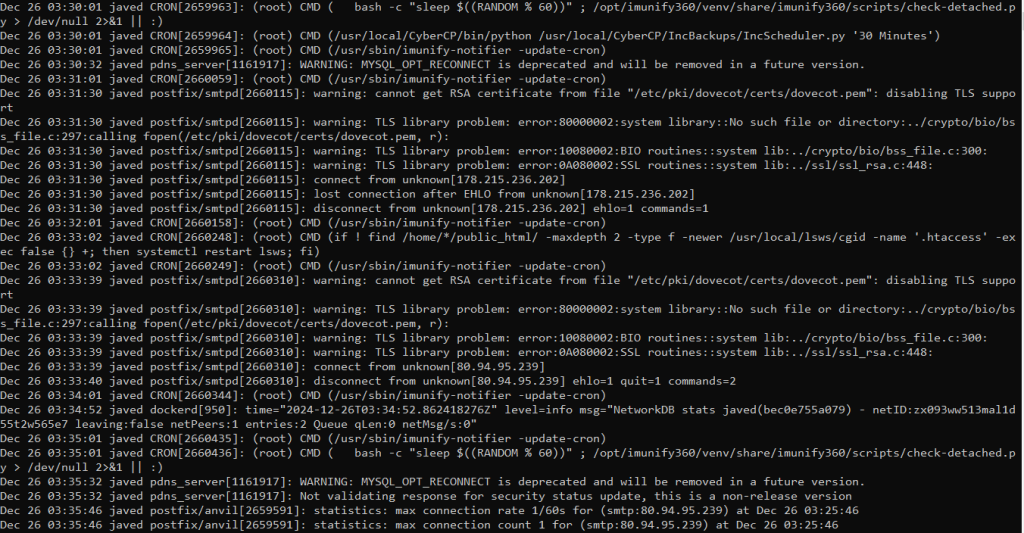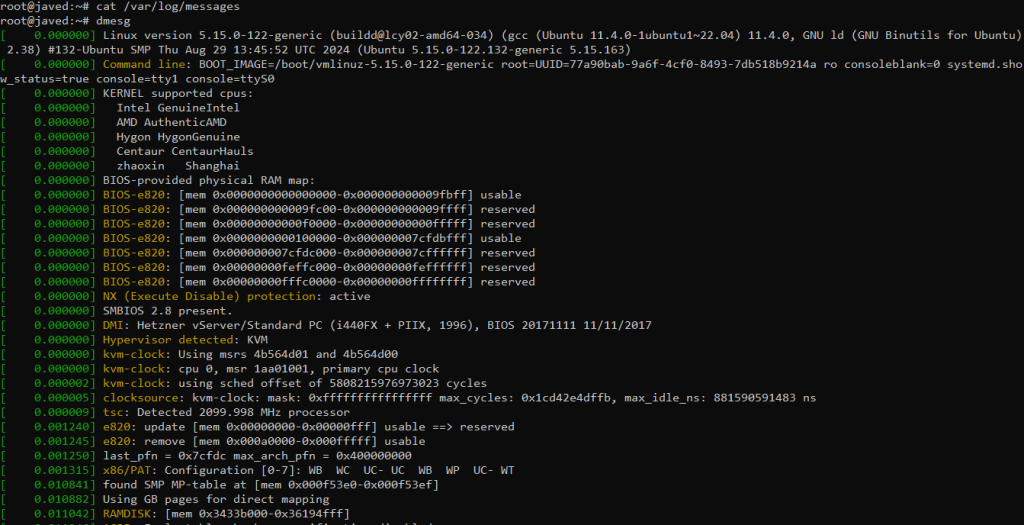All at some point in their lives, developers need to check out the Linux logs. Especially if they are Linux administrators since log files and journals are important to a system administrator’s work. Log files contain all the information about a system and are crucial for troubleshooting and auditing. They contain events and messages by the kernel, applications, and users that log into the system.
Introduction to Linux Logs
Linux logs are crucial records that capture various events and activities within the Linux environment. These logs are vital for the system administrators and developers to troubleshoot and monitor system performance.
Where are Linux Logs located?
Linux logs are stored in text files in the /var/log/ directory.
A Linux log would typically include;
- System Events: to track kernel activities, boot processes, and hardware interactions.
- Application Behavior: Monitor software performance to detect application-level issues.
- Security Activities: authentication attempts, firewall activities, and threats.
- Network Traffic: Analyze connectivity, WiFi issues, and domain processing errors.
Maintaining and understanding Linux logs is highly essential to keep your system secure, stable, and efficient.
Get exclusive access to all things tech-savvy, and be the first to receive
the latest updates directly in your inbox.
Types of Linux Logs
System-generated Linux logs each serve a different purpose. Some help maintain security, others are responsible to monitor system activities and diagnosing issues. Listed below are some of the most important types of Linux Logs.
- System Linux Logs
System Linux logs track the operating system activities and events, such as boot processes, kernel events, and system performance metrics. These logs are saved in;
- /var/log/syslog: General system activity logs.
- /var/log/kern.log: Kernel-related logs.
- Application Linux Logs
To monitor application behavior and performance running on the system, such as errors, warnings, and status updates from databases. These logs are saved in:
- /var/log/apache2/: Apache web server logs.
- /var/log/mysql/: MySQL database logs.
- Security Linux Logs
To record authentication attempts across events and control potential security threats for example failed login attempts, user activity, and firewall logs. These logs are located in:
- /var/log/auth.log: Authentication logs.
- /var/log/secure: Security-related logs (on Red Hat-based systems).
- Network Linux Logs
Network Linux logs capture details about the network activity and connections, such as packet transfer, connectivity issues, and domain activities. These logs are located in:
- /var/log/messages: General network and system messages.
- /var/log/ufw.log: Firewall (UFW) activity logs.
- Debug Linux Logs
To provide detailed debugging information and make troubleshooting easy for complex issues, such as verbose application or system-level messages. These logs are saved in:
- Location depends on the application being debugged (e.g., /var/log/debug).
- Custom Linux Logs
These custom logs are created for specific applications or server scripts, such as third party applications. These logs are stored in:
- Defined by the application or script (e.g., /var/log/custom_app.log).
List of Linux Network Logs
Linux logs provide detailed insights into activities, traffic, and connection issues. These logs are crucial for diagnosing connectivity problems and enhancing network security.
- General Network Linux Logs
These logs record general network activity and messages. They are used to monitor network interfaces and diagnose general connectivity issues. These logs are saved in:
- /var/log/messages (on Red Hat-based systems).
- /var/log/syslog (on Debian-based systems).
- Firewall Linux Logs
To capture traffic filtered by the firewall, identify blocked traffic, and debug firewall rules. These logs are located in:

- /var/log/ufw.log (for systems using UFW).
- /var/log/iptables.log (if iptables logging is enabled).
- DHCP Linux Logs
To track DHCP server and client interactions, analyze IP address assignments, and debug DHCP-related connectivity issues. These logs are saved in:
- /var/log/syslog (on Debian-based systems).
- /var/log/messages (on Red Hat-based systems).
- DNS Logs
To log Domain Name System for queries and responses and troubleshoot domain resolution problems. These logs are located in:
- /var/log/named.log (for BIND DNS server).
- Custom locations based on DNS software configuration.
- Network Manager Logs
To record actions of the Network Manager service, track WiFi connections, and diagnose interface-specific issues. The logs are saved in:
- /var/log/syslog or /var/log/NetworkManager.log.
- WiFi Logs
To capture the wireless network activities and debug WiFi authentication and connection errors. Monitor signal strength and interface. These logs are saved in:
- /var/log/wpa_supplicant.log (for WPA-related logs).
- SSH Logs
To Record Secure Shell connections and activities, monitor remote login attempts, and identify potential unauthorized access. These logs are saved in:
- /var/log/auth.log (on Debian-based systems).
- /var/log/secure (on Red Hat-based systems).
- Proxy Server Logs
To log HTTP/s traffic routed through a proxy server, track web requests, and troubleshoot proxy-related connectivity issues. These logs are saved in:
- /var/log/squid/access.log (for Squid proxy server).
- VPN Linux Logs
To capture Virtual Private Network activities, monitor errors, and debug encryption or handshake failures. These logs are saved in:
- /var/log/openvpn.log (for OpenVPN).
- Custom Network Logs
To log custom scripts or network tools with monitoring of specific network activities. These files are saved in:
- Defined by the tool or script (e.g., /var/log/custom_network.log).
Troubleshooting with Linux Logs
Here is how you can troubleshoot effectively using Linux logs.
| Issue | Key Logs to Check | Steps to Troubleshoot |
| System Issues | /var/log/syslog, /var/log/messages | – Use grep to search for errors or warnings.- Analyze recent entries for anomalies. |
| Wi-Fi Issues | /var/log/syslog, /var/log/wpa_supplicant.log, /var/log/dmesg | – Search for Wi-Fi-related entries using grep.- Check if the network interface is active using ifconfig or ip a. |
| Network Connectivity Problems | /var/log/syslog, /var/log/ufw.log, /var/log/iptables.log | – Verify the network interface status with ip link show.- Ping a known address (e.g., ping 8.8.8.8).- Review logs for blocked connections or packet drops. |
| Application Issues | Application-specific logs (e.g., /var/log/apache2/error.log) | – Search for error entries using grep.- Use log timestamps to correlate errors with recent changes. |
| Domain Join Issues | /var/log/messages, /var/log/syslog, /var/log/ssd/ | – Review domain-related errors using grep.- Check time synchronization between the client and domain controller. |
How to View Linux Logs?
Viewing and monitoring Linux logs are essential to keep the system running effectively. Here is how you can view your Linux logs.
- Using the cat Command
To display the entire contents of a log file together, use the command:
cat /var/log/syslog
- Using the tail command
To display a few lines of log, use the command:
tail -n 50 /var/log/syslog
tail -f /var/log/syslog
- Using the less command
To allow scrolling through a log file, use command:
less /var/log/syslog
- Using the grep command
To filter logs according to the relevant entries, use command:
grep “error” /var/log/syslog
- Using journalctl command
To provide access to logs managed by systemd, use command:
journalctl
journalctl -u nginx.service
journalctl –since “1 hour ago”
journalctl -f
- Viewing specific logs
To view specific logs, use the following command:
- System Logs:
cat /var/log/syslog
cat /var/log/messages
- Authentication Logs:
cat /var/log/auth.log
cat /var/log/secure
- Kernel Logs:
dmesg | less
- Application Logs:
cat /var/log/apache2/error.log
How to Check Linux Logs Using CyberPanel
You can also view CyberPanel to view mail server logs since the web hosting control panel allows you to access server level logs from domain/log.
Access the Logs Section:
- From the CyberPanel dashboard, navigate to the “Logs” section in the sidebar on the left-hand side.
- Under the “Logs” section, you will typically find various types of logs, such as Access Logs, Error Logs, System Logs, etc.
For more in-depth system logs, such as those related to authentication, services, or kernel messages, you can use SSH to directly access the logs on the server.
Log in to the server using SSH:
root@your-server-ip
Once logged in, you can use commands like:cat /var/log/syslog(general system logs)

dmesg(kernel logs)

Best Practices for Managing Linux Logs
For optimized system performance, manage your Linux logs with these best practices:
- Use tools like Rsyslog, Graylog, or ELK Stack to collect and analyze logs from multiple systems.
- Configure logrotate to prevent logs from using too much disk space.
- Restrict access with permission files.
- Use tail -f or tools like Logwatch to detect issues proactively.
- Use commands like grep, awk or tools like Logstash to focus on relevant log entries.
- Define log retention policies to meet regulatory requirements.
These practices ensure logs are well-organized, secure, and actionable.
Frequently Asked Question: Linux Logs
1. How do I rotate Linux logs?
Log rotation is typically handled by the logrotate tool, which manages log file size and retention to prevent them from consuming too much disk space.
2. What if I can’t find a log file?
If a log file is missing or not being generated, check the configuration files for the service or application. Ensure proper logging settings are enabled.
3. What is the most common Linux log?
The /var/log/syslog file is one of the most important and contains general system activity logs, including boot messages and kernel events.
Wrapping it Up!
Effectively managing Linux logs is essential for a well-behaved system. Therefore, you should regularly track, monitor, and manage your Linux logs.
To conclude, mastering Linux logs empowers you to maintain a reliable and efficient system environment to ensure streamlined operations and minimum downtime. Regular monitoring and proactive log management are the secret behind utilizing the full potential of your Linux system!



